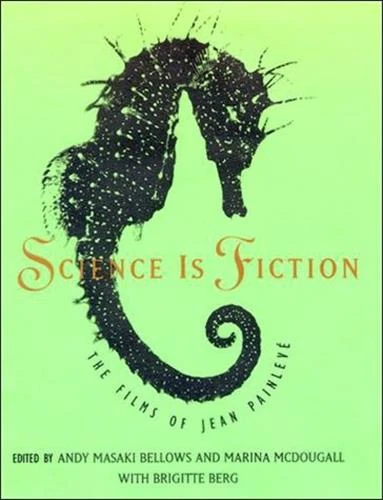Science Is Fiction. The Films Of Paul Painleve
Par : ,Formats :
- Paiement en ligne :
- Livraison à domicile ou en point Mondial Relay indisponible
- Retrait Click and Collect en magasin gratuit
- Réservation en ligne avec paiement en magasin :
- Indisponible pour réserver et payer en magasin
- Nombre de pages213
- PrésentationBroché
- Poids0.54 kg
- Dimensions16,8 cm × 22,0 cm × 1,7 cm
- ISBN0-262-52318-3
- EAN9780262523189
- Date de parution11/10/2001
- ÉditeurMIT Press (The)
Résumé
One of the first to plunge underwater with a camera to bring the subaquatic world to the screen, maverick scientific documentary filmmaker jean Painlevé (1902-1989) captured the throes of a male seahorse giving birth and the mating habits of hermaphrodite mollusks. In a lifetime spanning nearly the history of cinema itself, Painlevé made more than two hundred films. His lyrical and instructive animal behavior films set to avant-garde scores were much admired by Surrealist contemporaries such as Antonin Artaud, Luis Buñuel, and jean Vigo.
Science is Fiction includes Marina McDougall's historically informative "Hybrid Roots," Brigitte Berg's illustrated biographical essay "Contradictory Forces," art critic Ralph Rugoff's "Fluid Mechanics," a Libération interview with Painlevé, stills from Painlevé's most celebrated films laid oui in storyboard fashion, and a selection of Painlevé's writings appearing for the first time in English. The latter includes "Neo-Zoological Drama," a playful romp on the behavior of Turbellaria, or flatworms, and "Scientific Film," a discussion of science films that pays homage to Painlevé's fellow pioneers.
The book also includes French film critic André Bazin's "Science Film: Accidental Beauty."
Science is Fiction includes Marina McDougall's historically informative "Hybrid Roots," Brigitte Berg's illustrated biographical essay "Contradictory Forces," art critic Ralph Rugoff's "Fluid Mechanics," a Libération interview with Painlevé, stills from Painlevé's most celebrated films laid oui in storyboard fashion, and a selection of Painlevé's writings appearing for the first time in English. The latter includes "Neo-Zoological Drama," a playful romp on the behavior of Turbellaria, or flatworms, and "Scientific Film," a discussion of science films that pays homage to Painlevé's fellow pioneers.
The book also includes French film critic André Bazin's "Science Film: Accidental Beauty."
One of the first to plunge underwater with a camera to bring the subaquatic world to the screen, maverick scientific documentary filmmaker jean Painlevé (1902-1989) captured the throes of a male seahorse giving birth and the mating habits of hermaphrodite mollusks. In a lifetime spanning nearly the history of cinema itself, Painlevé made more than two hundred films. His lyrical and instructive animal behavior films set to avant-garde scores were much admired by Surrealist contemporaries such as Antonin Artaud, Luis Buñuel, and jean Vigo.
Science is Fiction includes Marina McDougall's historically informative "Hybrid Roots," Brigitte Berg's illustrated biographical essay "Contradictory Forces," art critic Ralph Rugoff's "Fluid Mechanics," a Libération interview with Painlevé, stills from Painlevé's most celebrated films laid oui in storyboard fashion, and a selection of Painlevé's writings appearing for the first time in English. The latter includes "Neo-Zoological Drama," a playful romp on the behavior of Turbellaria, or flatworms, and "Scientific Film," a discussion of science films that pays homage to Painlevé's fellow pioneers.
The book also includes French film critic André Bazin's "Science Film: Accidental Beauty."
Science is Fiction includes Marina McDougall's historically informative "Hybrid Roots," Brigitte Berg's illustrated biographical essay "Contradictory Forces," art critic Ralph Rugoff's "Fluid Mechanics," a Libération interview with Painlevé, stills from Painlevé's most celebrated films laid oui in storyboard fashion, and a selection of Painlevé's writings appearing for the first time in English. The latter includes "Neo-Zoological Drama," a playful romp on the behavior of Turbellaria, or flatworms, and "Scientific Film," a discussion of science films that pays homage to Painlevé's fellow pioneers.
The book also includes French film critic André Bazin's "Science Film: Accidental Beauty."


